
Chiang Kai-shek was a Chinese politician, revolutionary, and military leader. He was the head of the Nationalist Kuomintang (KMT) party, General of the National Revolutionary Army, known as Generalissimo, and the leader of the Republic of China (ROC) in mainland China from 1928 until 1949. After being defeated in the Chinese Civil War by the Chinese Communist Party (CCP) in 1949, he led the ROC on the island of Taiwan until his death in 1975.
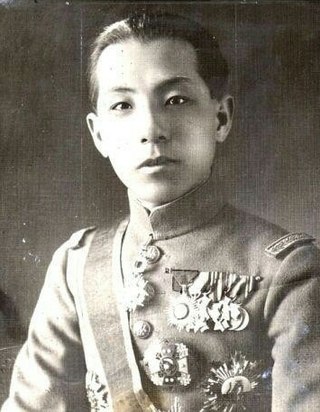
Chang Hsueh-liang, also romanized as Zhang Xueliang and known later in life as Peter H. L. Chang, was a Chinese warlord who ruled Manchuria from 1928 to 1936 and the commander-in-chief of the Northeastern Army after the assassination of his father, Zhang Zuolin. A reformer who was sympathetic to nationalist ideas, he completed the official reunification of China at the end of the Warlord Era by pledging loyalty to the Nationalist government in Nanjing. He nonetheless retained Manchuria's de facto autonomy until the Empire of Japan invaded and occupied the region in 1931. He was frustrated by Chiang Kai-shek's policy of "first internal pacification, then external resistance" and helped plan and lead the 1936 Xi'an Incident. Northeastern soldiers under Chang's command arrested Chiang to force him to negotiate a Second United Front with the Chinese Communist Party against Japan. Chiang eventually agreed, but upon his release he had Chang arrested and sentenced to 50 years of house arrest, first in mainland China and then in Taiwan. Although never personally a communist, Chang is regarded by the Chinese Communist Party and the People's Republic of China as a patriotic hero for his role in ending the encirclement campaigns and beginning the war of resistance against Japan.

Zhou Enlai was a Chinese statesman, diplomat, and revolutionary who served as the first Premier of the People's Republic of China from September 1954 until his death in January 1976. Zhou served under Chairman Mao Zedong and aided the Communist Party in rising to power, later helping consolidate its control, form its foreign policy, and develop the Chinese economy.

The Chinese Civil War was fought between the Kuomintang-led government of the Republic of China and the forces of the Chinese Communist Party, with armed conflict continuing intermittently from 1 August 1927 until 7 December 1949, resulting in a Communist victory and control of mainland China in the Chinese Communist Revolution.

The Northern Expedition was a military campaign launched by the National Revolutionary Army (NRA) of the Kuomintang (KMT) against the Beiyang government and other regional warlords in 1926. The purpose of the campaign was to reunify China, which had become fragmented in the aftermath of the Revolution of 1911. The expedition was led by Generalissimo Chiang Kai-shek, and was divided into two phases. The first phase ended in a 1927 political split between two factions of the KMT: the right-leaning Nanjing faction, led by Chiang, and the left-leaning faction in Wuhan, led by Wang Jingwei. The split was partially motivated by Chiang's Shanghai Massacre of Communists within the KMT, which marked the end of the First United Front. In an effort to mend this schism, Chiang Kai-shek stepped down as the commander of the NRA in August 1927, and went into exile in Japan.
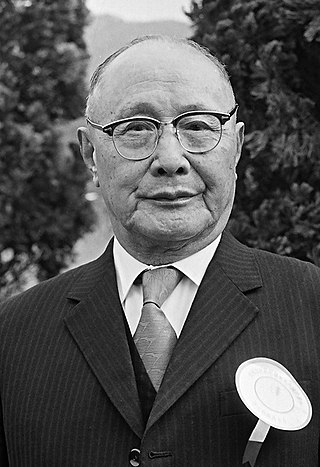
He Yingqin also Ho Ying-chin, was a Chinese politician and one of the most senior generals of the Kuomintang (KMT) during Nationalist China, and a close ally of Chiang Kai-shek.
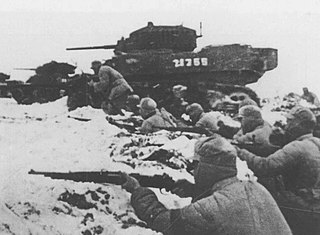
The Huaihai campaign, or Battle of Hsupeng, was one of the military conflicts in the late stage of the Chinese Civil War between the Kuomintang and the Chinese Communist Party (CCP). The campaign started when the People's Liberation Army (PLA) launched a major offensive against the Kuomintang headquarters in Xuzhou on 6 November 1948, and ended on 10 January 1949 when the PLA reached the north of the Yangtze.
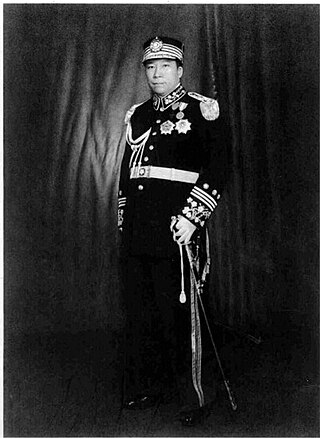
Yang Hucheng was a Chinese general during the Warlord Era of Republican China and Kuomintang general during the Chinese Civil War.

The Nationalist government, officially the National Government of the Republic of China, refers to the government of the Republic of China from 1 July 1925 to 20 May 1948, led by the nationalist Kuomintang (KMT) party.

The Northeastern Army, also known as the Fengtian Army, was a Chinese army that existed from 1911 to 1937. It was created by General Zhang Zuolin and his "Fengtian Clique", who controlled Northeastern China (Manchuria) during China's Warlord Era. The Northeastern Army participated in many of the Warlord Era's conflicts and by the mid-1920s had become the dominant force in north China. However, the Kuomintang defeated the Northeastern Army and Zhang's allies during the Northern Expedition. In 1928, Zhang Zuolin was assassinated and succeeded by his son Zhang Xueliang. Xueliang pledged loyalty to the Kuomintang, bringing almost all of China under the same national government for the first time since 1917.

The Second United Front was the alliance between the ruling Kuomintang (KMT) and the Chinese Communist Party (CCP) to resist the Japanese invasion of China during the Second Sino-Japanese War, which suspended the Chinese Civil War from 1937 to 1945.

The Shanghai massacre of 12 April 1927, the April 12 Purge or the April 12 Incident as it is commonly known in China, was the violent suppression of Chinese Communist Party (CCP) organizations and leftist elements in Shanghai by forces supporting General Chiang Kai-shek and conservative factions in the Kuomintang. Following the incident, conservative KMT elements carried out a full-scale purge of communists in all areas under their control, and violent suppression occurred in Guangzhou and Changsha. The purge led to an open split between left-wing and right-wing factions in the KMT, with Chiang Kai-shek establishing himself as the leader of the right-wing faction based in Nanjing, in opposition to the original left-wing KMT government based in Wuhan, which was led by Wang Jingwei. By 15 July 1927, the Wuhan regime had expelled the Communists in its ranks, effectively ending the First United Front, a working alliance of both the KMT and CCP under the tutelage of Comintern agents. For the rest of 1927, the CCP would fight to regain power, beginning the Autumn Harvest Uprising. With the failure and the crushing of the Guangzhou Uprising at Guangzhou however, the power of the Communists was largely diminished, unable to launch another major urban offensive.
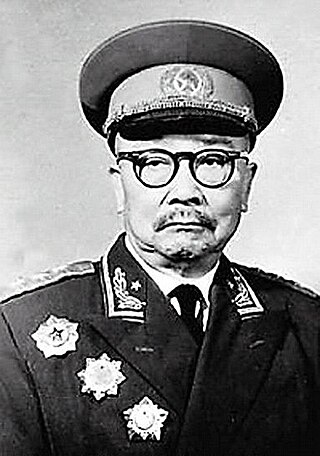
Li Kenong was a Chinese general and politician, one of the creators of the security and intelligence apparatus of both the Chinese Communist Party (CCP) and the People's Liberation Army. Notably, he served as Director of the Central Investigation Department, Deputy Chief of the PLA General Staff Department and Deputy Minister of Foreign Affairs and was awarded the rank of General in 1955.
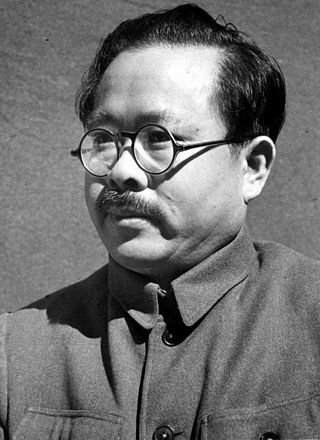
Ren Bishi was a military and political leader in the early Chinese Communist Party (CCP).

The Chinese Communist Revolution was a social and political revolution that culminated in the establishment of the People's Republic of China (PRC) in 1949. For the preceding century, China had faced escalating social, economic, and political problems as a result of Western imperialism, Japanese imperialism, and the decline of the Qing dynasty. Cyclical famines and an oppressive landlord system kept the large mass of rural peasantry poor and politically disenfranchised. The Chinese Communist Party (CCP) was formed in 1921 by young urban intellectuals inspired by European socialist ideas and the success of the October Revolution in Russia. The CCP originally allied itself with the nationalist Kuomintang (KMT) party against the warlords and foreign imperialist forces, but the 1927 massacre of Communists in Shanghai ordered by Kuomintang leader Chiang Kai-shek forced them into the Chinese Civil War, which would last more than two decades.
The Xi'an Incident is a 1981 Chinese historical drama film directed by Cheng Yin (成荫), starring Jin Ange, Wang Tiecheng and Sun Feihu. It was produced by the Xi’an Film Studio (西安电影制片厂) and seeks to be a historically accurate representation of the 1936 Xi'an Incident.
Lu Zhiying, original name Lu Zijiang, was a Chinese communist intelligence officer.
Wang Bingnan (1908–1988) was a diplomat and foreign affairs official of the Chinese Communist Party and the People's Republic of China.

The Chongqing Negotiations were a series of negotiations between the Kuomintang-ruled Nationalist government and the Chinese Communist Party (CCP) from 29 August to 10 October 1945, held in Chongqing, China. The negotiations were highlighted by the final meeting between the leaders of both parties, Chiang Kai-shek and Mao Zedong, which was the first time they had met in 20 years. Most of the negotiations were undertaken by Wang Shijie and Zhou Enlai, representatives of the Nationalist government and CCP, respectively. The negotiations lasted for 43 days, and came to a conclusion after both parties signed the Double Tenth Agreement.

The Wuhan Nationalist government, also known as the Wuhan government, Wuhan regime, or Hankow government, was a government dominated by the left-wing of the Nationalist or Kuomintang (KMT) Party of China that was based in Wuhan from 5 December 1926 to 21 September 1927, led first by Eugene Chen, and later by Wang Jingwei.





















